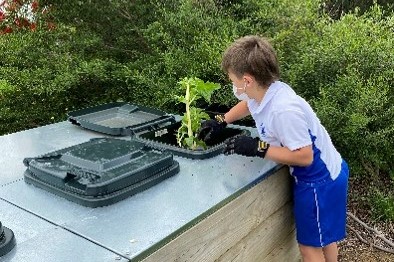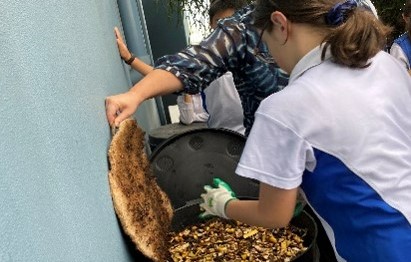Students get hands-on to help the environment

This article was originally published by the Stephanie Alexander Kitchen Garden Foundation on Friday 12 November, 2021.
Right around the nation, young people are leading the way in the battle to save the planet. Here at the Foundation, we aim to support their efforts by encouraging a holistic, hands-on approach to learning about the environment. One where students are responsible for developing their own gardens, caring for the chickens, turning the compost, and planting and harvesting their own seasonal crops. Step into any Kitchen Garden Program in Australia and you’ll see students taking action to build a more sustainable food production system.
At Mother Teresa Catholic Primary School in Mount Ridley, Victoria students have created an incredible zero-waste worm farm system and are learning the ropes of regenerative farming first-hand. The project is overseen by the school’s Sustainability Specialist Teacher, Annette Gasbarro, and led by a dedicated team of students.
We asked one of the student Sustainability Leaders about their involvement in the program, and why they believe it is important to work towards a greener future.

Q: Tell us some of the ways the Kitchen Garden Program has helped you learn more about composting, recycling, reusing and reducing?
A: As a learning community, the kitchen garden program has provided us with an appreciation of the importance of composting, recycling, reusing and reducing.
Composting plays an important part in our kitchen garden program because the compost goes directly into the compost bins to feed our worms. The worms eat the food scraps and they produce worm tea (fertilizer). The worm tea is a rich source of natural fertilizer which is used in our vegetable garden promoting healthy vegetables.
Recycling is an important part of our daily lives. By recycling we are helping our environment by reducing the amount of waste. We can recycle by using reusable things such as plastic containers, metal straws and recyclable bottles.
Reusing and reducing has a big impact on our environment. By reusing we are reducing packaging which limits the amount of waste going to landfill.
Q: Why do you think it is important to compost?
A: It is important to compost and have a worm farm because it reduces the waste we have within our school community. By having worm farms we can recycle our food waste by feeding it to the worms. The worms then produce a natural resource called worm tea that helps our plants grow.

Q: Do you think students have a responsibility to look after the environment?
A: As part of the Kids Teaching Kids program here at school it is our responsibility to look after the environment by educating our peers. By educating our peers we are demonstrating responsibility towards the environment for present and future generations. This will provide us with a healthy and better world to live in.
Q: What is your favourite part about being involved in the school’s kitchen garden?
A: As a learning community, our favourite part about being involved in the school’s kitchen garden program is that we are able to engage in cooking with other children and preparing a delicious meal that is shared with students and staff. The fact that we cook with the produce grown in our vegetable garden makes the dishes taste much more delicious.
Q: What is something you would like to do more of in the kitchen garden?
A: Something we would like to do more of in our kitchen garden is to research and cook various cultural foods within our learning community. This will give us a better understanding about different cultures and their foods. It also gives us the opportunity to develop an appreciation for different tastes and flavours.
Q: What are some of the skills you have learned through taking part in the Kitchen Garden Program?
A: The kitchen garden program provides us with many opportunities such as learning about cooking and preparing delicious meals that you can share with family and friends. It also encourages us to try a variety of different foods that we are not familiar with. By engaging in gardening we are learning about fresh seasonal produce, care maintenance and how to harvest our produce.
Hear from the kitchen garden program coordinators to learn more about sustainability initiatives at Mother Teresa Catholic Primary School. Thanks to Annette Gasbarro and Tina Sabato for taking time out to their talk us through what’s happening on campus – and the wider community.
Looking to implement more sustainability measures in your own school Kitchen Garden Program? Log onto the Shared Table to check out our resource detailing eight key environmental impacts of the food system.
Help more students care for the planet and learn the environmental impact of the food on their plates with a donation to expand the Kitchen Garden Program.
< Back to Latest News
